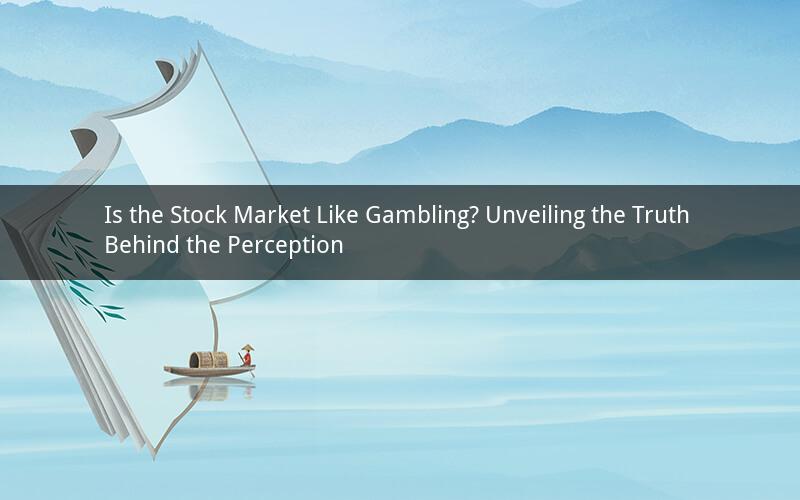
The stock market, a complex web of financial transactions, has long been a topic of debate and intrigue. Many people compare it to gambling, arguing that it involves luck, risk, and the potential for significant gains or losses. In this article, we will delve into the similarities and differences between the stock market and gambling, shedding light on the truth behind this perception.
1. Luck and Risk
One of the most striking similarities between the stock market and gambling is the element of luck. Both involve a certain degree of chance, as outcomes can be unpredictable. In gambling, luck plays a significant role in the roll of dice, the flip of a coin, or the draw of cards. Similarly, in the stock market, luck can affect the performance of a stock or the overall market.
However, it is important to note that while luck can play a role in both, it is not the sole determinant of success. In the stock market, skill, knowledge, and analysis are crucial factors that can outweigh the influence of luck. Traders and investors who possess a deep understanding of financial markets and employ effective strategies are more likely to achieve consistent returns, regardless of luck.
2. Risk Management
Gambling and the stock market both involve risk, but the approach to managing that risk differs significantly. In gambling, the focus is often on the potential for a big win, and risk management may not be a top priority. This can lead to impulsive decisions and significant losses.
In contrast, the stock market requires disciplined risk management. Traders and investors must assess the risk associated with their investments and implement strategies to mitigate potential losses. This may involve diversifying their portfolios, setting stop-loss orders, and conducting thorough research before making investment decisions.
3. Skill and Knowledge
While luck plays a role in both gambling and the stock market, skill and knowledge are crucial in achieving long-term success. In gambling, skill can manifest in the form of understanding game strategies, odds, and probabilities. Similarly, in the stock market, skill involves analyzing financial statements, studying market trends, and making informed decisions based on available information.
Moreover, knowledge is power in both domains. In gambling, understanding the rules and nuances of different games can enhance the chances of winning. In the stock market, staying informed about economic indicators, corporate earnings, and market news is essential for making sound investment choices.
4. Emotional Control
Emotional control is a vital skill in both gambling and the stock market. In gambling, emotional control helps prevent impulsive decisions and irrational behavior. Similarly, in the stock market, emotional control is crucial for maintaining discipline and sticking to investment strategies.
Emotional biases, such as fear of missing out (FOMO) or overconfidence, can lead to poor decision-making and significant losses. Traders and investors who can manage their emotions and remain calm during market fluctuations are more likely to achieve long-term success.
5. Financial Goals
The ultimate goal of gambling is to win money, while the stock market serves as a means to grow wealth over time. While both involve financial gains, the primary objective of the stock market is to generate returns through investments in companies with potential for growth.
Investors in the stock market focus on long-term financial goals, such as saving for retirement or building wealth. They are willing to endure short-term volatility in pursuit of these objectives. In contrast, gamblers may prioritize immediate gratification and are more focused on the thrill of winning.
In conclusion, while there are similarities between the stock market and gambling, such as the element of luck and risk, the key differences lie in the approach to managing these elements. The stock market requires skill, knowledge, and emotional control to achieve long-term success, while gambling often focuses on short-term gains and the thrill of winning. Understanding these differences can help individuals make informed decisions and approach the stock market with a more realistic perspective.
Questions and Answers:
1. Q: Can the stock market be considered a form of gambling?
A: The stock market shares some similarities with gambling, such as the element of luck and risk. However, the focus on long-term financial goals and the requirement of skill and knowledge differentiate it from traditional gambling.
2. Q: Is it possible to make money in the stock market without luck?
A: Yes, it is possible to make money in the stock market without luck. By employing effective strategies, conducting thorough research, and managing risk, investors can achieve consistent returns over time.
3. Q: Does emotional control play a role in both gambling and the stock market?
A: Yes, emotional control is crucial in both gambling and the stock market. It helps prevent impulsive decisions and irrational behavior, leading to better decision-making and long-term success.
4. Q: What is the main difference between the stock market and gambling?
A: The main difference lies in the focus on long-term financial goals in the stock market, compared to the pursuit of immediate gratification in gambling.
5. Q: Can a person with no financial background succeed in the stock market?
A: While having a strong financial background can be beneficial, it is not a requirement for success in the stock market. With dedication, research, and the willingness to learn, anyone can become a successful investor.